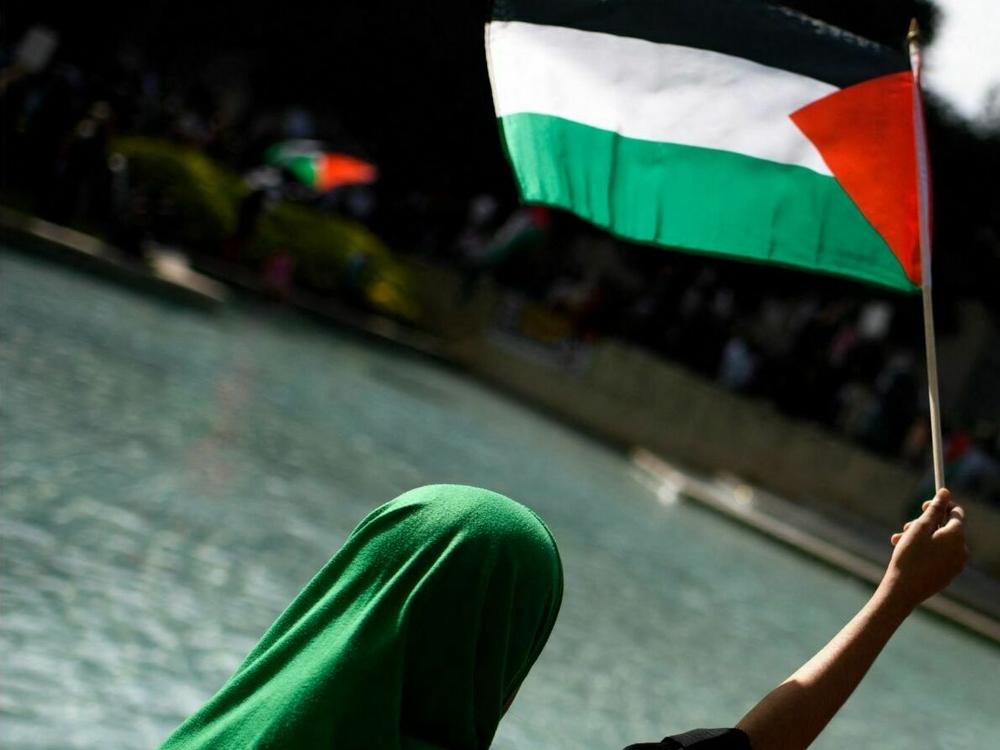Section Branding
Header Content
Cultural figures find perils to speaking out and staying silent about Mideast crisis
Primary Content
Updated October 28, 2023 at 2:58 PM ET
In recent years, social media backlash has become commonplace as cultural figures and organizations use digital platforms to express their views in response to world events.
But some have also been facing real-world consequences — fallout that goes well beyond the realm of social media — for making public declarations about the present Israel-Hamas conflict.
The real-world consequences of taking sides
In the world of talent management, Maha Dakhil at the high profile Creative Artists Agency, who represents Tom Cruise, Natalie Portman and Madonna among other A-listers, resigned from the agency's internal board last Sunday after posting a series of anti-Israeli comments on social media. Dakhil also stepped down from co-leading CAA's motion pictures department.
Then, on Tuesday, Dakhil's outspoken stance on the war caused one of the agency's top clients, West Wing and Social Network creator Aaron Sorkin, to ditch CAA and return to his former agency William Morris Endeavor. "Maha isn't an antisemite," Sorkin said in a statement to NPR. "She's just wrong."
Dakhil isn't the only powerful Hollywood agent to experience fallout from speaking out about the conflict. On Thursday, Kitty Laing, United Agents' head of comedy, stepped down from her role on the agency's executive committee as a result of her anti-Israel social media posts. (However, Laing will continue to work with her client list.)
And the real-world fallout from speaking out about the war isn't just happening in Hollywood. There are fractures appearing across the cultural landscape.
At least two 92NY (92nd Street Y) employees resigned after the famed New York cultural center did not go forward with a scheduled appearance by Pulitzer Prize-winning author Viet Thanh Nguyen and put the remainder of its poetry reading season on hold. Nguyen was among the 700-plus writers who signed an open letter published in the London Review of Books calling for a ceasefire in Gaza. "I have no regrets about anything I have said or done in regards to Palestine, Israel, or the occupation and war," the author posted on Instagram.
And on Thursday, David Velasco, editor-in-chief of ArtForum was ousted by its parent company, Penske Media Corporation, a few days after the international visual art magazine published an open letter calling for an end to violence against civilians in the conflict and humanitarian aid to Gaza. The initial letter did not condemn the Hamas attack on Israel. It was later revised.
Then, on Friday and Saturday, several ArtForum staffers announced their resignations, including Associate Editor Kate Sutton, and Senior Editors Zack Hatfield and Chloe Wyma. "The firing of David Velasco violates everything I had cherished about the magazine and makes my work there untenable," Wyma posted on X (formerly Twitter).
The perils of staying silent
At the same time, choosing not to speak out is bringing about similar pitfalls, as the Writers Guild of America (WGA) recently discovered.
The union, which represents Hollywood screenwriters, issued a response on Tuesday to a letter sent by more than 300 of its members, including Jerry Seinfeld, The Marvelous Mrs. Maisel creator Amy Sherman-Palladino, and Homeland's Gideon Raff, asking why the WGA had failed to make a statement condemning Hamas' attack against Israel.
The WGA's eventual statement to its members, published in full by Variety, called Hamas' Oct. 7 attack on Israel "an abomination" and explained why it had not initially issued a public statement about the conflict. The union denied "masking hateful views" and being "paralyzed by factionalism," and said it was "humbled by the magnitude of this conflict."
But the WGA's explanation has not stopped some writers from questioning their union membership, or in the case of at least one writer, letting it go. Dan Gordon, who co-wrote Wyatt Earp with Kevin Costner and The Hurricane with Denzel Washington, resigned his WGA membership on Tuesday, calling the union's lack of a statement "appalling."
To speak out or not to speak out?
All of this comes at a time when much of the public expects and even favors cultural figureheads who speak out about world events.
Nearly half of the 2,000-plus people who responded last week to a poll by the Hollywood Reporter said it is "very appropriate" or "somewhat appropriate" for a celebrity to speak out about the Israel-Hamas conflict. Less than one third said they didn't think it was appropriate, while a quarter had no opinion on the matter.
"There's a growing sense that as a publicly visible figure you also carry a social and political responsibility that comes with the attention capital you possess, and which can be converted into political influence and discursive power," said Sandra Mayer, a literary and cultural historian based at the Austrian Academy of Sciences, and co-editor of the recently published anthology Authorship, Activism and Celebrity.
"With the rise of social media in the past 15-20 years, the apparent leveling of public discourse, and the growth of opportunities of interaction between prominent public figures and ordinary citizens, there is a greater pressure for such individuals to speak out and to take advantage of the privileges and opportunities their status affords them."
Mayer said because of the "contentious and extremely emotionalized" nature of this particular conflict, it's not surprising that both speaking out and remaining silent has been landing cultural figures and groups in trouble.
But she said celebrities will probably continue to use their platforms to share their opinions about this war — and other issues — regardless of the consequences.
"It is probably too early to tell how and to what extent this will affect the future of celebrity stand-taking," Mayer said. "But I don't think we can expect celebrities to become less vocal in the future."
Copyright 2023 NPR. To see more, visit https://www.npr.org.

